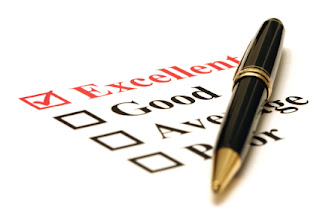
Having your expertise on word usage challenged by someone who is illiterate is an interesting experience. My five year old gets all of his information on this topic from a girl who comes up to my pockets. “Libby says 'yea' is not a word,” he informed me with confidence on a car ride home from school. I explained 'yea' was informal speech – OK to use with friends, but not with grownups.
Who was I to question Libby, he wanted to know. She has continually espoused her knowledge to her classmates since the beginning of the school year.
“A trick is a lie!”
“Booty is a bad word!”
“I saw Hailey’s brother naked!” (She's also an expert in anatomy.)
My son doesn’t care that Libby can only read about as many words as he, which as of this posting is still in the single digits, or that her best literary references come from
One Fish, Two Fish, Red Fish, Blue Fish. In his mind, she is an expert.
What makes you, or me, or anyone an expert on anything? Education? Experience? Money? An appearance on Oprah? The ability to shout louder than all the other kids in Mrs. Dawson’s Pre-K class?
A fellow business owner told me how a potential client dashed her hopes of landing a new account with a single interview question - “Where did you get your MBA?” She was deflated. Her 25 years experience, her work on national campaigns, and her bulging portfolio became irrelevant with six words. His definition of a marketing expert included an advanced degree.
I was described as an expert once. I experienced palpitations as a result of the utterance. A man emceeing a professional organization’s monthly meeting introduced me, the scheduled speaker, as an expert on social media. My eyes widened as I looked into the faces of dozens of my peers. The word traveled through my ears snaked through my body, encircled my heart and squeezed. Had he not seen the bio I sent? Did he not hear me prior to his announcement when I said I preferred to be described as an independent PR practitioner who has done research on viral videos? I decided he was not an expert on introductions.
Dictionary.com lists the
definition of an expert as: a person who has special skill or knowledge in some particular field; specialist; authority.
I have knowledge of food preparation and certain amount of cooking skill, but an expert in the kitchen? Julia Child I am not.
The definition doesn't concern me as much as the connotation. To be all-knowing. Wise beyond all others in your field. The ability to pass a pop-quiz at any time. Unflappable. Right. Always.
When I pitch clients to the media, I feel confident their expertise would bring value to the ten o'clock news because I rely on facts. A dermatologist with 30 plus years experience who has treated thousands of patients is an expert on skin. A consultant who saves his clients, on average, $30,000 on college expenses is an expert on tuition planning. Of these things I'm sure.
Expertise can be less tangible than statistics, and is a bit like beauty – in the eye of the beholder. If you were referred to me by someone I know, or have created a body of work that I appreciate, you are an expert. I make that decision based on what is important to me - the letters after your name, the work you've created, our shared acquaintances.
Someday I’ll tell Ethan my personal definition - someone who has made all the mistakes in a particular field. This less formal description is much easier to live up to, but probably wouldn’t meet Libby’s standards. Defining the word this way releases the pressure, and let's people know you've worked hard, you learned some things, and are willing to help others even at the risk of being scrutinized.
 The critical element in all of this is measurement. Was it
the whiz, or the bang that made customers react to your efforts? How does someone know if all the moving parts had an impact?
Which caused the biggest reaction? What should you keep doing? What needs to be
scrapped, or changed? The hype comes easily, the value is harder to define.
The critical element in all of this is measurement. Was it
the whiz, or the bang that made customers react to your efforts? How does someone know if all the moving parts had an impact?
Which caused the biggest reaction? What should you keep doing? What needs to be
scrapped, or changed? The hype comes easily, the value is harder to define. 








